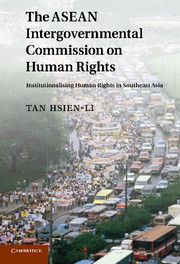 The ASEAN Intergovernmental Commission on Human Rights
The ASEAN Intergovernmental Commission on Human Rights Book contents
- Frontmatter
- Contents
- List of tables
- Preface
- 1 Charting the human rights institutionalisation process in Southeast Asia
- 2 Enough of ‘Asian values’: roots of the ASEAN states' reticence towards human rights
- 3 Self-determination and democracy: the human rights experiences of five ASEAN states
- 4 Instituting the regional rights regime: the ASEAN Intergovernmental Commission on Human Rights (AICHR) and the role of civil society
- 5 Human rights understanding between the ASEAN region and the United Nations: convergence, regional cohesion, and national responsibility
- 6 The unexplored aspect of human rights: what ASEAN needs to understand about the right to development
- 7 Sustaining AICHR's substantive empowerment: implementation, integration, and international law
- Bibliography and sources
- Index
6 - The unexplored aspect of human rights: what ASEAN needs to understand about the right to development
Published online by Cambridge University Press: 07 September 2011
- Frontmatter
- Contents
- List of tables
- Preface
- 1 Charting the human rights institutionalisation process in Southeast Asia
- 2 Enough of ‘Asian values’: roots of the ASEAN states' reticence towards human rights
- 3 Self-determination and democracy: the human rights experiences of five ASEAN states
- 4 Instituting the regional rights regime: the ASEAN Intergovernmental Commission on Human Rights (AICHR) and the role of civil society
- 5 Human rights understanding between the ASEAN region and the United Nations: convergence, regional cohesion, and national responsibility
- 6 The unexplored aspect of human rights: what ASEAN needs to understand about the right to development
- 7 Sustaining AICHR's substantive empowerment: implementation, integration, and international law
- Bibliography and sources
- Index
Summary
Introduction
Where the previous chapters dealt with how the more traditional aspects of human rights have been transforming the Association of Southeast Asian Nations (ASEAN) region, this chapter will deal with a relatively unexplored dimension – the interplay between Southeast Asia and the right to development. Although the term ‘right to development’ has been bandied about by many developing states, including those from ASEAN, not enough consideration has gone into defining what it really consists of or how it is to play a role in the international human rights discourse. Given the purported importance of socio-economic, cultural, and development rights to ASEAN states, it is important to elucidate the exact parameters of the right to development so as to see how it can take shape and be exercised within the region.
For much of the international community, human rights remains largely centred on the so-called first and second generations of civil-political and economic, social, and cultural rights respectively. Nonetheless, this third generation – development rights – is taking mincing steps towards a more tangible persona in the global arena through the development discourse's adoption of rights-based programmes and methodologies. It is gradually shedding its unflattering tag of a right that aims to encompass all human rights but in actuality does not consist of anything tangible.
As the name suggests, the right to development revolves around the mutual engagement of human rights and development.
- Type
- Chapter
- Information
- The ASEAN Intergovernmental Commission on Human RightsInstitutionalising Human Rights in Southeast Asia, pp. 206 - 247Publisher: Cambridge University PressPrint publication year: 2011
